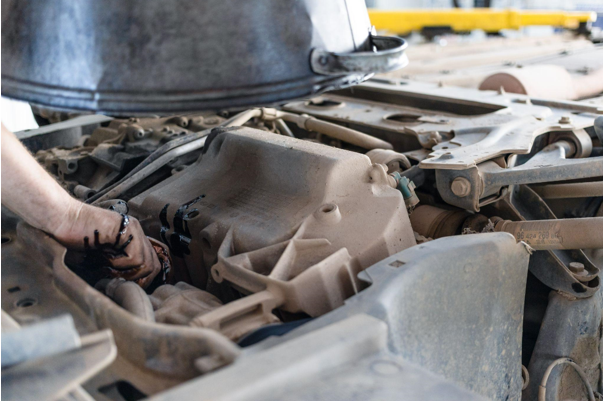How bad are engine oil leaks and how to avoid them

Fluids are necessary for your car to run. They must be maintained at an optimum level to prevent wear and tear, maintain the car’s condition, keep you safe while driving, and give you a comfortable ride.
Your car needs engine oil, transmission fluid, coolant, brake fluid, steering fluid, and windshield fluid. While all are important, engine oil is the most critical fluid you should give extra attention to. Your car engine generates heat and has multiple moving parts. Engine oil provides proper lubrication and helps regulate the engine temperature.
You might notice that after leaving your car parked, there are a few liquid drops on the floor. If the liquid is brown, thick, and greasy, it’s likely engine oil. However, engine oil is not supposed to leak.
Are engine oil leaks that bad?
You will see how common engine oil leaks are if you check out parking spots. A few drops of oil are not uncommon. However, driving your car with a low oil level can lead to serious engine problems when left uncared for. Engine parts don’t get the correct lubrication with improper oil levels; this leads to friction and wear. Overheating is a likely result. And it also hurts your car’s engine power and fuel efficiency.
What are the common causes of oil leaks?
1. Worn out engine gaskets and oils pans
These two are located at the bottom of the engine. They get significant wear, especially when you go over rough roads. Over time, they get faulty and show engine oil leaks as a signal that they need to be replaced.
2. Improper installation of engine components
The engine has many parts that, when improperly installed, can cause leaks. Check if engine components are too tight or too loose.
3. Defective seals and rings
Damaged valve seals and rings can cause minor leakage.
How to avoid engine oil leaks?
The first rule of maintaining your engine oil at an optimum level is knowing when to change it. Over time, engine oil gets burned, breaks down, becomes less effective as a lubricant, and causes leaks. Apart from ensuring that the engine components like the engine gaskets and oil pans are in good condition, you must ensure the oil itself is still okay.
Your car manufacturer has a recommended interval for an oil change. The intervals used to be so close together, within three months, but with improvements in engine oil quality and other technology, you can go six months or more. However, it’s also essential to use the correct oil type ad not just any oil you can get. Especially for newer cars, there are performance grades and viscosity standards.
Other than the recommended interval for changing oil, you can also watch out for signs that it’s time to change it: when starting your engine makes a ticking sound, when the oil is thick and dark, and when you have a problem starting your engine.
What happens if you don’t change your engine oil for a long time? You accelerate engine tear and can suffer from irreversible damage due to clogging.